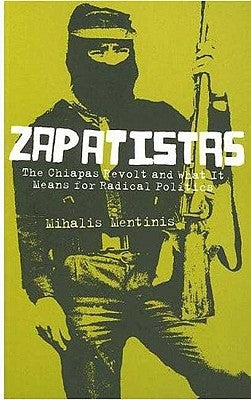1
/
of
1
Pluto Press (UK)
Zapatistas: The Chiapas Revolt and What It Means for Radical Politics
Zapatistas: The Chiapas Revolt and What It Means for Radical Politics
Regular price
$68.11 USD
Regular price
Sale price
$68.11 USD
Shipping calculated at checkout.
Quantity
Couldn't load pickup availability
The Zapatista Army for National Liberation burst onto the world stage on 1 January 1994. Zapatista commander Subcomandante Marcos announced a revolution, and declared war on the Mexican government and global capitalism. Since then, the Zapatistas have inspired thousands of activists across the world. They have attracted much attention from political theorists and analysts. Despite this, there is little consensus about the real nature and efficacy of the movement. Zapatistas provides a bold new approach to understanding the insurrection. Mentinis spent nine months visiting the Zapatista autonomous zone, and the result is this unique exploration of the indigenous political theory emerging within the movement. Combining this with an analysis of the integrity of the Zaptista project, Mentinis draws on the concept of the 'event' from Badiou, ideas from Situationism, the 'project of autonomy' of Cornelius Castoriadis and the 'constituent power' of Antonio Negri, to present a rigourous account of the movement and the impact it has had on radical political theory.
Author: Mihalis Mentinis
Publisher: Pluto Press (UK)
Published: 04/01/2006
Pages: 224
Binding Type: Paperback
Weight: 0.60lbs
Size: 8.48h x 5.32w x 0.47d
ISBN: 9780745324869
Review Citation(s):
Reference and Research Bk News 05/01/2007 pg. 72
Author: Mihalis Mentinis
Publisher: Pluto Press (UK)
Published: 04/01/2006
Pages: 224
Binding Type: Paperback
Weight: 0.60lbs
Size: 8.48h x 5.32w x 0.47d
ISBN: 9780745324869
Review Citation(s):
Reference and Research Bk News 05/01/2007 pg. 72
About the Author
Sebastian Dullien is a Professor of International Economics at HTW Berlin - University of Applied Sciences. He is Senior Fellow of the American Institute for Contemporary German Studies (AICGS) at the Johns Hopkins University. Hansjorg Herr is a Professor at the Berlin School of Economics. He is the author of one of Germanya (TM)s leading economics text books. Christian Kellermann is the Director of the Nordic Office of the Friedrich Ebert Foundation (FES) in Stockholm. Before joining the FES, he worked as a financial market analyst in Frankfurt and New York.
This title is not returnable
Share


